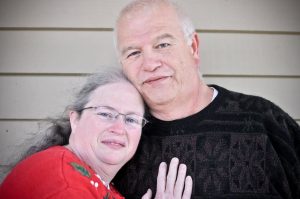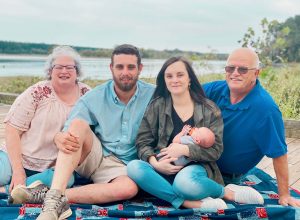Published: May 19, 2021

Facing New Battles: Becoming a Military Connected Caregiver
Did you know that roughly 200,000 service members transition out of the military annually?(1) A military career is unique in that an entire culture and lifestyle is created, enveloping service members in a very different way of life. It can be difficult to transition out of that culture and adjust to life outside of the service, leaving many veterans feeling unsure, unstable, and disconnected. Without support and guidance, many find themselves struggling with unemployment and financial difficulties.
Unemployed and homeless is how Joan first met her Air Force veteran husband. Sadly, Joan’s husband was sure he had to navigate the challenges alone as he didn’t think his time in service qualified him to receive any assistance or support through the VA. It wasn’t until 2018, when Joan was desperately seeking medical care for her husband, that she realized he’d been mistaken for all these years. Joan and her husband had both become very sick with upper respiratory infections, and her husband was struggling to breathe. Despite what her husband had told her about not qualifying for VA care, Joan took him to the local VA hospital with his DD214 and their marriage license in hand, and begged them to treat him. Joan recalled the VA staff doing far beyond that.
“Not only was my husband admitted, but I was allowed to stay with him, too,” Joan recalled. “I was also ill with the same symptoms, a combination of a respiratory infection and the flu. While I could not be treated, the staff caring for my husband also quietly monitored my vitals, made sure I had bedding, and made sure I stayed hydrated and had soup and crackers. After he was through the worst of it, he was assigned a PCP [Primary Care Physician], received mental health care, and a social worker helped us get access to a newly opened transitional housing apartment complex for homeless veterans. It was a game changer.”
 With support from the VA, Joan and her husband found the stability they had been searching for since her husband’s discharge. They relocated to Louisiana where her husband continued to receive care from the local VA medical center. The VA began investigating health concerns that had gone untreated for many years. After a lifetime of challenges, Joan felt like they had finally found solid ground and were making progress. Little did she know, she’d be tested yet again.
With support from the VA, Joan and her husband found the stability they had been searching for since her husband’s discharge. They relocated to Louisiana where her husband continued to receive care from the local VA medical center. The VA began investigating health concerns that had gone untreated for many years. After a lifetime of challenges, Joan felt like they had finally found solid ground and were making progress. Little did she know, she’d be tested yet again.
In September of 2020, what was originally believed to be early onset dementia for her husband was later diagnosed as a brain tumor. Soon thereafter, Joan’s husband underwent a craniotomy to remove the tumor, which was biopsied and confirmed to be a glioblastoma. “Our lives have been turned upside down,” Joan shared. “I went from being an equal partner to the primary caregiver and head of household practically overnight.” Once again, Joan’s family found themselves facing an impossibly difficult transition — this time, with Joan becoming her husband’s caregiver.
While not often talked about, there are actually 5.5 million military and veteran caregivers in the U.S. today. These hidden heroes provide support and care for wounded warriors and/or exceptional family members. Most do so without necessary support and training. In fact, according to the 2020 Resilience Under Stress Study (RUSS; conducted during the height of the COVID-19 pandemic), caregivers had fewer social resources than their non-caregiver peers: fewer friends, fewer people to ask for a favor, and less social support. Without any time to prepare and adjust, Joan found herself in that very vulnerable position.
Fortunately for her, someone noticed her struggles and offered to help. “At a post-operative PT/OT evaluation for my husband, the therapist realized how overwhelming all the deficits and needs were for me to grasp,” Joan said. “She asked if I needed and would accept support. I was so stunned and grateful to be asked. I said, ‘Yes, I need help.’” Within two days of that appointment, Joan was contacted by Blue Star Families and enrolled in the Caregiver Cohort program.
Each year, with the help of Veterans United, Blue Star Families brings together military-connected caregivers to take part in self-care workshops and activities in their local communities. This gives them a dedicated time to focus on themselves and an opportunity to connect with other caregivers. What originated as an in-person program, the events create a network, offer valuable training to best support their mental well-being, and provide a much-needed outlet. While the pandemic created challenges in how the program would be offered this year, it also made delivering support for caregivers more important than ever. Vicky Perkins, Senior Manager of National Chapter and Programs at Blue Star Families, designed a cohort model that focuses on year-round virtual workshops and a corresponding caregivers box.
gives them a dedicated time to focus on themselves and an opportunity to connect with other caregivers. What originated as an in-person program, the events create a network, offer valuable training to best support their mental well-being, and provide a much-needed outlet. While the pandemic created challenges in how the program would be offered this year, it also made delivering support for caregivers more important than ever. Vicky Perkins, Senior Manager of National Chapter and Programs at Blue Star Families, designed a cohort model that focuses on year-round virtual workshops and a corresponding caregivers box.
To lead the virtual workshops, Vicky recruited Tammy Meyer, a military spouse and professional life coach. Together, Vicky and Tammy have strategically developed self-care events based on survey data and feedback to directly impact the lives of caregivers. Joan and 49 other caregivers will take part in these workshops while learning to diffuse stress and anxiety, identifying personal values and goals, and determining an ideal picture for their lives and a plan to achieve it. They’ll walk away with the training and tools needed to focus on their well-being to better support their family. “Having the cohort and a creative outlet is helping me deal with the changes and looming losses without falling into negative habits and thoughts,” Joan said. “I am making progress without expecting perfection of myself. Thank you so much for providing this opportunity.”
We all need (and deserve) a community that empowers us to thrive. That’s why, here at Blue Star Families, our mission is to be the connector, allowing you and your family to find that network of support—whether through caregiver toolkits full of information and resources, organized Coffee Connect events to share and learn from one another, or virtual Caregiver Cohort workshops led by an expert on self-care and wellness.
To learn more about the resources available to military caregivers, please visit our website at www.bluestarfam.org/caregivers/
(1) U.S. Government Accountability Office
Posted In: Caregivers
